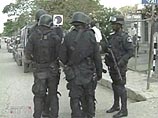Haitian kidnappers required $200,000 to release the Russian hostage
The Russian hostage has already been released without a ransom

Unknown individuals kidnapped a Russian citizen in Haiti on April 30th, France Presse news agency reported with reference to a spokesman for the UN mission in Haiti. The Russian citizen, whose name has not been exposed to the public yet, was working in Haiti on a UN mission contract. He was kidnapped along with an Indian businessman, who also cooperated with the UN. The Russian and the Indian men became the first foreigners to have been kidnapped in Haiti after the collapse of Jean Aristide's regime in February of 2004. 
It has been recently reported that the Russian hostage, who was kidnapped in Haiti on April 30th for the purpose of obtaining ransom, was released. Alexander Yakovenko, an official spokesman for the Russian Foreign Affairs Ministry, said that the Russian citizen's psychological and physical condition was normal.
The hostage was released on May 5th owing to the joint efforts taken by the Russian embassy in Caracas and the UN mission to Haiti. The Russian man, whose name was later unveiled as D. Khmelevsky, was working in Haiti according to the UN mission contract. Yakovenko added that the Russian hostage had been released without paying ransom to the hostage-takers. The released hostage is to return back to Russia on May 7th.
D. Khmelevsky is an employee of a Russian aircraft-servicing company, which was connected with the UN mission to Haiti. The kidnappers contacted local officials and required a ransom for the hostage. Russia does not have a diplomatic mission in Haiti. Spokesmen for the Russian embassy in Venezuela arrived in Haiti to assist in the release of the Russian hostage. Alexander Yakovenko said that the kidnappers asked for $200,000 to release the Russian hostage. Media sources reported later that it became possible to reduce the sum of the ransom from 200 to 2 thousand USD. The hostage-takers were keeping the Russian national in normal conditions and did not subject him to coercion.
The UN contingent in Haiti counts 5,000 military men; the contingent was deployed on the island in the spring of 2004. It became possible to establish law and order only in the north of the country so far, whereas rebels, who ousted Haitian President Aristide, still control Haiti's south.
Armed rebels forced President Aristide leave the country last year. According to France Presse, oppositionists took a big part of the island under their control and neared the country's capital. The former Haitian leader is reportedly staying in the Dominican Republic.
Aristide, 50, became the President of Haiti in 1991. He became the first democratic leader of the country; the people of Haiti pinned big hopes on the new president. However, the resentment of the local population was growing with each year and eventually resulted in massive riots. US spin doctors say that Aristide, a former Catholic priest, started his political career being moved with good intentions that subsequently vanished in greediness and corruption.
Subscribe to Pravda.Ru Telegram channel, Facebook, RSS!


